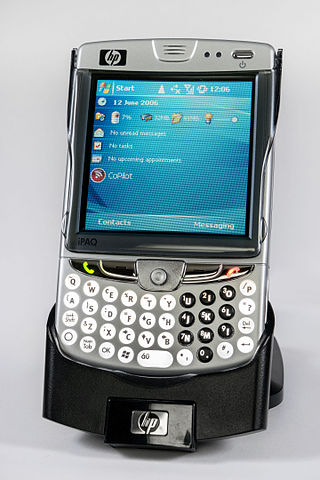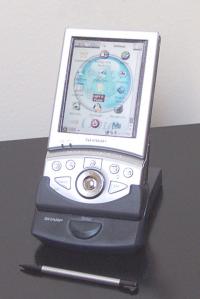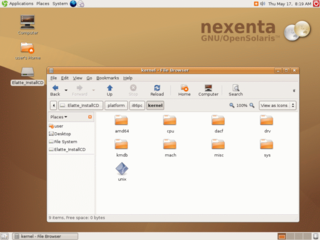
A Linux distribution is an operating system made from a software collection that includes the Linux kernel, and often a package management system. Linux users usually obtain their operating system by downloading one of the Linux distributions, which are available for a wide variety of systems ranging from embedded devices and personal computers to powerful supercomputers.

The iPAQ is a discontinued Pocket PC and personal digital assistant which was first unveiled by Compaq in April 2000.

GoboLinux is a Linux distribution whose most prominent feature is a reorganization of the traditional Linux file system. Rather than following the Filesystem Hierarchy Standard like most Unix-like systems, each program in a GoboLinux system has its own subdirectory tree, where all of its files may be found. Thus, a program "Foo" has all of its specific files and libraries in /Programs/Foo, under the corresponding version of this program at hand. For example, the commonly known GCC compiler suite version 8.1.0, would reside under the directory /Programs/GCC/8.1.0.
Windows Embedded Compact, formerly Windows Embedded CE, Windows Powered and Windows CE, is an operating system subfamily developed by Microsoft as part of its Windows Embedded family of products.

The Sharp Zaurus is the name of a series of personal digital assistants (PDAs) made by Sharp Corporation. The Zaurus was the most popular PDA during the 1990s in Japan and was based on a proprietary operating system. The first Sharp PDA to use the Linux operating system was the SL-5000D, running the Qtopia-based Embedix Plus. The Linux Documentation Project considers the Zaurus series to be "true Linux PDAs" because their manufacturers install Linux-based operating systems on them by default. The name derives from the common suffix applied to the names of dinosaurs.

GPE is a graphical user interface environment for handheld computers, such as palmtops and personal digital assistants (PDAs), running some Linux kernel-based operating system. GPE is a complete environment of software components and applications which makes it possible to use a Linux handheld for tasks such as personal information management (PIM), audio playback, email, and web browsing.

A live CD is a complete bootable computer installation including operating system which runs directly from a CD-ROM or similar storage device into a computer's memory, rather than loading from a hard disk drive. A live CD allows users to run an operating system for any purpose without installing it or making any changes to the computer's configuration. Live CDs can run on a computer without secondary storage, such as a hard disk drive, or with a corrupted hard disk drive or file system, allowing data recovery.
Qt Extended is an application platform for embedded Linux-based mobile computing devices such as personal digital assistants, video projectors and mobile phones. It was initially developed by The Qt Company, at the time known as Qt Software and a subsidiary of Nokia. When they cancelled the project the free software portion of it was forked by the community and given the name Qt Extended Improved. The QtMoko Debian-based distribution is the natural successor to these projects as continued by the efforts of the Openmoko community.
Operating systems based on the Linux kernel are used in embedded systems such as consumer electronics, in-vehicle infotainment (IVI), networking equipment, machine control, industrial automation, navigation equipment, spacecraft flight software, and medical instruments in general.

OpenEmbedded is a build automation framework and cross-compile environment used to create Linux distributions for embedded devices. The OpenEmbedded framework is developed by the OpenEmbedded community, which was formally established in 2003. OpenEmbedded is the recommended build system of the Yocto Project, which is a Linux Foundation workgroup that assists commercial companies in the development of Linux-based systems for embedded products.

Nexenta OS, officially known as the Nexenta Core Platform, is a discontinued computer operating system based on OpenSolaris and Ubuntu that runs on IA-32- and x86-64-based systems. It emerged in fall 2005, after Sun Microsystems started the OpenSolaris project in June of that year. Nexenta Systems, Inc. initiated the project and sponsored its development. Nexenta OS version 1.0 was released in February 2008.
Squashfs is a compressed read-only file system for Linux. Squashfs compresses files, inodes and directories, and supports block sizes from 4 KiB up to 1 MiB for greater compression. Several compression algorithms are supported. Squashfs is also the name of free software, licensed under the GPL, for accessing Squashfs filesystems.

Wubi is a free software Ubuntu installer, that was the official Windows-based software, from 2008 until 2013, to install Ubuntu from within Windows, to a single file within an existing Windows partition.
The Ångström distribution is a defunct Linux distribution for a variety of embedded devices. The distribution is the result of work by developers from the OpenZaurus, OpenEmbedded, and OpenSIMpad projects. The graphical user interfaces (GUIs) available are OPIE and GPE among other options.
Kickstart is the bootstrap firmware of the Amiga computers developed by Commodore International. Its purpose is to initialize the Amiga hardware and core components of AmigaOS and then attempt to boot from a bootable volume, such as a floppy disk. Most Amiga models were shipped with the Kickstart firmware stored on ROM chips.
Linux for mobile devices, sometimes referred to as mobile Linux, is the usage of Linux-based operating systems on portable devices, whose primary or only Human interface device (HID) is a touchscreen. It mainly comprises smartphones and tablet computers, but also some mobile phones, personal digital assistants (PDAs) portable media players that come with a touchscreen separately.

FBReader is an e-book reader for Linux, Microsoft Windows, Android, and other platforms.

Familiar Linux is a discontinued Linux distribution for iPAQ devices and other personal digital assistants (PDAs), intended as a replacement for Windows CE. It can use OPIE or GPE Palmtop Environment as the graphical user interface.











